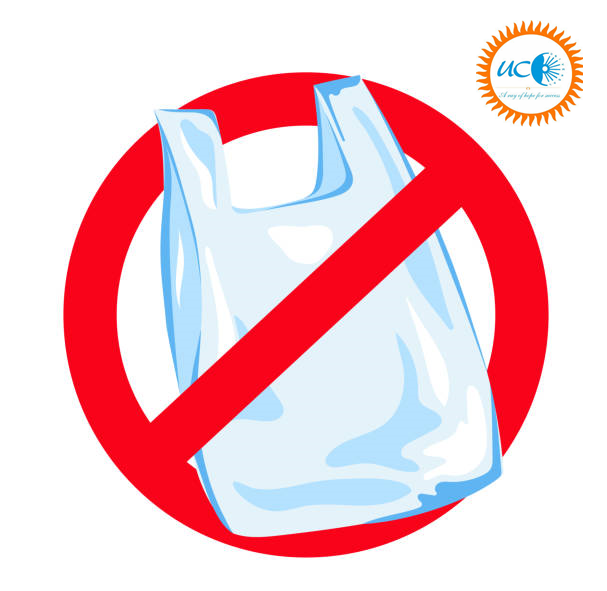Ban on Single Use Plastics
Why in the News?
Recently, the Plastic Waste Management Rules, 2016, as amended, provide the statutory framework and the prescribed authorities for enforcement of the rules, including ban on identified single use plastic items.
The following identified single use plastic items, which have low utility and high littering potential, have been prohibited, with effect from 1st July, 2022, vide Plastic Waste Management Amendment Rules, 2021:
- Earbuds with plastic sticks, plastic sticks for balloons, plastic flags, candy sticks, ice- cream sticks, polystyrene [Thermocol] for decoration;
- Plates, cups, glasses, cutlery such as forks, spoons, knives, straw, trays, wrapping or packaging films around sweet boxes, invitation cards, and cigarette packets, plastic or PVC banners less than 100 micron, stirrers.
Recent Development:
- The notification also prohibits manufacture, import, stocking, distribution, sale and use of plastic carry bags having thickness less than seventy-five microns with effect from 30th September 2021, and having thickness less than thickness of one hundred and twenty microns with effect from the 31st December, 2022.
- The following steps have been taken to strengthen implementation of Plastic Waste Management Rules, 2016 and to implement ban on identified single use plastic items:
- All thirty-six States/UTs have constituted the Special Task Force under the chairpersonship of the Chief Secretary / Administrator for elimination of identified single use plastic items and effective plastic waste management.
- A National Level Taskforce has also been constituted by the Ministry for taking coordinated efforts to eliminate identified single use plastic items and effective implementation of Plastic Waste Management Rules, 2016.
- Three meetings of the National Task Force have been held.
- The State /UT Governments and concerned Central Ministries/Departments have also been asked to develop a comprehensive action plan for elimination of single use plastic and implement it in a time bound manner.
Directions have been issued under Section 5 of the Environment (Protection) Act, 1986 to the following:
- Plastic raw material manufacturers to stop supplying plastic raw material for manufacture of banned single use plastic items,
- SPCBs/PCCs were directed to revoke / modify consent / registration issued to banned SUP producers,
- State Urban Development Department has been directed to take necessary action for implementation of SUP ban. Separately, custom authorities have been asked to stop the import of banned SUP items.
For effective monitoring of ban on identified single use plastic items and plastic waste management in the country the following online platforms are in operation (a) National Dashboard on for monitoring of comprehensive action plan implementation, (b) CPCB Monitoring Module for Compliance on Elimination of Single Use Plastic, and (c) CPCB Grievance Redressal App.
A one month long pan India enforcement campaign was undertaken for implementation of ban on identified single use plastic items from 1st to 31st July 2022. Further, States and Union territories have been asked to undertake regular enforcement drives to implement the ban.
What is Plastic waste? What are its components?
- Thermoplastics and Thermoset plastics are the two main types of plastics that make up plastic waste.
- The total amount of post-consumer plastic garbage produced in India is made up of 80% thermoplastics and 20% thermoset.
- Polyethylene Terephthalate (PET), Low Density Poly Ethylene (LDPE), Poly Vinyl Chloride (PVC), High Density Poly Ethylene (HDPE), Polypropylene (PP), Polystyrene (PS), and other thermoplastics are recyclable plastics.
- Alkyd, epoxy, ester, melamine formaldehyde, phenol formaldehyde, silicon, urea formaldehyde, polyurethane, metalized and multilayer plastics are among the materials found in Thermoset plastics.
Need for Plastic waste management:
- According to reports, 15,000 tonnes of plastic garbage are produced every day, of which 9, 000 tonnes are collected and treated, while 6, 000 tonnes are not.
- Millions of plastic bags end up in the environment each year—in the soil, water bodies, and water courses—and it takes a plastic bag, on average, 1,000 years to degrade entirely. Plastic carry bags are one of the main sources of discarded debris.
- The actual problem is to enhance plastic waste management systems because there isn’t a viable environmentally friendly option that can totally replace plastic.
Plastic Waste (Management) Rules, 2016
- The Extended Producers’ Responsibility (EPR) Act, a novel concept, is being used by the new plastic waste management regulations to reduce the 6,000 tonnes of uncollected plastic garbage produced per day. The following are the other modes of the new plastic management rules:
- To make it easier to collect and recycle plastic garbage, increase the minimum thickness of plastic carry bags from 40 to 50 microns and mandate a minimum thickness of 50 microns for plastic sheets.
- To include rural areas as well as the municipal area, the jurisdiction of application should be expanded.
- To incorporate the obligations of producers and generators into the system for managing plastic waste and to develop a framework for producers and brand owners to collect back plastic garbage in accordance with Extended Producers Responsibility.
- To begin introducing the collecting of plastic waste management fees through pre-registration of the manufacturers, importers, and sellers of plastic carry bags and multilayered packaging.
- To encourage the use of plastic trash for road construction in accordance with Indian Road Congress recommendations, or to promote energy recovery, waste to oil production, etc., in order to profitably utilise waste while also addressing the problem of waste disposal.
- Increased accountability for waste generators, including user fee payment in accordance with local authority guidelines, garbage collection and delivery by institutional generators, and event organisers
- To more effectively apply these regulations, prioritise source segregation, recycling, and involve trash collectors, recyclers, and processors in the collection of plastic waste, as well as adopt the polluter pays concept to ensure the long-term viability of the waste management system.






